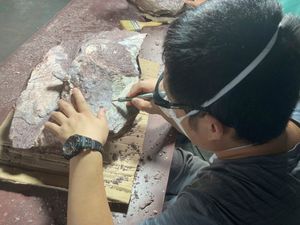Hong Kong discovers dinosaur fossils for the first time
The fossils were contained in rock found on Port Island in the Unesco Global Geopark.

Officials in Hong Kong say they have discovered dinosaur fossils for the first time on a remote, uninhabited island which is part of a geo park.
Experts confirmed the fossils were part of a large dinosaur from the Cretaceous period, about 145 million to 66 million years ago, the government said in a statement.
They will conduct further studies to confirm the species of the dinosaur.

Experts speculate that the dinosaur was likely to have been buried by sand and gravel after its death before it was later washed to the surface by a large flood, and subsequently buried again at the discovery site.
The government said the conservation department in March informed its Antiquities and Monuments Office about a sedimentary rock containing substances suspected to be vertebrate fossils.
The rock was found on Port Island in the Unesco Global Geopark in the city’s north-eastern waters.
The government said it had commissioned mainland Chinese experts to conduct field investigations.

Port Island is closed to the public from Wednesday until further notice to facilitate investigations and excavations.
The fossils will be on display at the Hong Kong Heritage Discovery Centre in Tsim Sha Tsui, one of the city’s popular shopping districts, starting on Friday.
The government is also planning to open a temporary workshop for the public to observe experts’ preparation of fossil specimens by the end of 2024.





